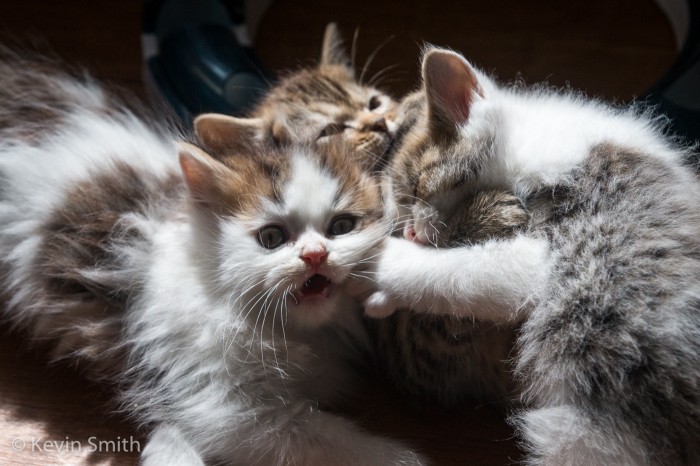Brighton volunteer’s top tips for better cat snaps
Brighton cat volunteer Kevin Smith has a knack for snapping purrfect cat pictures and is keen to share his tips for capturing lockdown moments with our feline friends.
Amateur photographer Kevin and his partner Katie have given shelter to many moggies as fosterers for Cats Protection’s Brighton Branch, including their current cats Sid Delicious and Mavis Bang Bang. WIth these tips, Kevin wanted to show that Cats Protection volunteers remain #HereForTheCats.

He said: “We fostered them as kittens and then decided to keep them. They’re just over a year old but still as entertaining. Lockdown means we’re spending a lot of time with our furry friends and, as anyone who loves cats knows, we can’t stop taking photos of them; my phone is full.”
Kevin’s love of photography developed when he went to Ethiopia to work at a teacher training college through Voluntary Services Overseas (VSO). He said: “Ethiopia was an amazing place to develop my skills. Everywhere I turned there was something interesting to photograph. I bought my first Digital SLR just before I went and always had it by my side while I was there.”
His passion was put to good use when Kevin (http://kevinsmithphoto.org/) returned to the UK and began volunteering at Cats Protection’s Brighton Branch. He said: “It’s great to work with cats and help them go to their forever homes. As volunteer fosterers, we took a lot of photos of cats in our care, and I still get to snap all the brilliant characters that come through the branch.
“Apart from it being fun, I like to capture each new personality and best show off their character. Our photos are used to publicise the cats on the branch website or on Facebook to help tell their story and increase their chances of being adopted. It’s a very fulfilling role.”
Kevin wants to share his experience to help people take better cat snaps. He said: “Staying home provides the perfect opportunity to work on your photo game and take better shots of your cats. Whether you grab quick snaps with a phone or use a fancy camera, these simple skills and straightforward tips should help to show your cats in the best light.”
Find the best light
Natural light through a window can give sharp photos with lots of detail and highlights. But artificial light can be used to your advantage or you can create drama with contrasting light. It’s even possible to get great shots of cats in the spotlight of a desk lamp. The golden hour is best; shortly after sunrise or before sunset, when light is more red and soft.
Consider the background
A white cat will look magnificent against a dark background. Similarly a dark cat against a light background to create contrast. Cats with patterned coats like tortoiseshells are most tricky because they look quite busy and can get visually lost. They look best against clear, pale backgrounds. Background is less of an issue if you zoom in close, which can blur the background.
Capture emotion
Pictures have most impact if they convey emotion. Whether your cat is stretched out on a rug, wild-eyed during play or staring wistfully out of the window, the stronger the emotion, the more impact. Think about when and where you’re most likely to catch them in this state.
Continuous shooting
Cats can be at their most dramatic when they’re lively and alert, but this usually means they’re moving around, making it difficult to get good photos. Get it right and you capture them with spectacular results. Take lots of shots in quick succession in the hope that at least one will be a golden shot. If you’re using a camera, use ‘burst’ or ‘continuous’ to take shots in quick succession. If you’re using your phone, keep snapping away and delete the duds after.
Get their attention
Cats don’t always play ball. They do what they like, which is what makes them so great. That extends to posing in your perfectly choreographed photo opportunity. Getting their attention by clicking fingers or dangling toys can be challenging when you’re holding your camera or phone. Remember, photos of cats looking away from the camera also carry lots of emotion.
Up close and use angles
A close-up on a cat’s eyes will get maximum emotional connection. To show them lounging on a rug or squashed into a cardboard box, include the setting in the picture to give context. Angles can transform a mediocre shot into something more creative and interesting. You can switch your phone camera from the default rear-facing to front-facing to get crazy angles for buddy shots while your cat is sitting next to you. Get down to their level for a cat’s eye view.
Use auto mode
When your cat treats you to some weird and wonderful behaviour, the last thing you want is to mess around with camera settings. Hardly anyone chooses the manual settings on phones as default auto settings are so good at adjusting to conditions. On a DSLR you might want to manually adjust settings for something extra creative, but you’re most likely to capture something great if you use settings you’re comfortable with. The camera will respond quicker than you to everything in front of the lens, including feline madness you’re hoping to capture.
Respect your cat and be patient
It can be tempting to get your cat to ‘do things’ for the camera but it should go without saying that we shouldn’t do anything that makes them feel uncomfortable or puts them in danger. When they’ve had enough, let them be. Don’t worry if photographic magic eludes you on a particular day; there’ll be plenty of other opportunities. Sometimes the best cat pictures show a cat being a cat. And, if all else fails, there’s always catnip.
